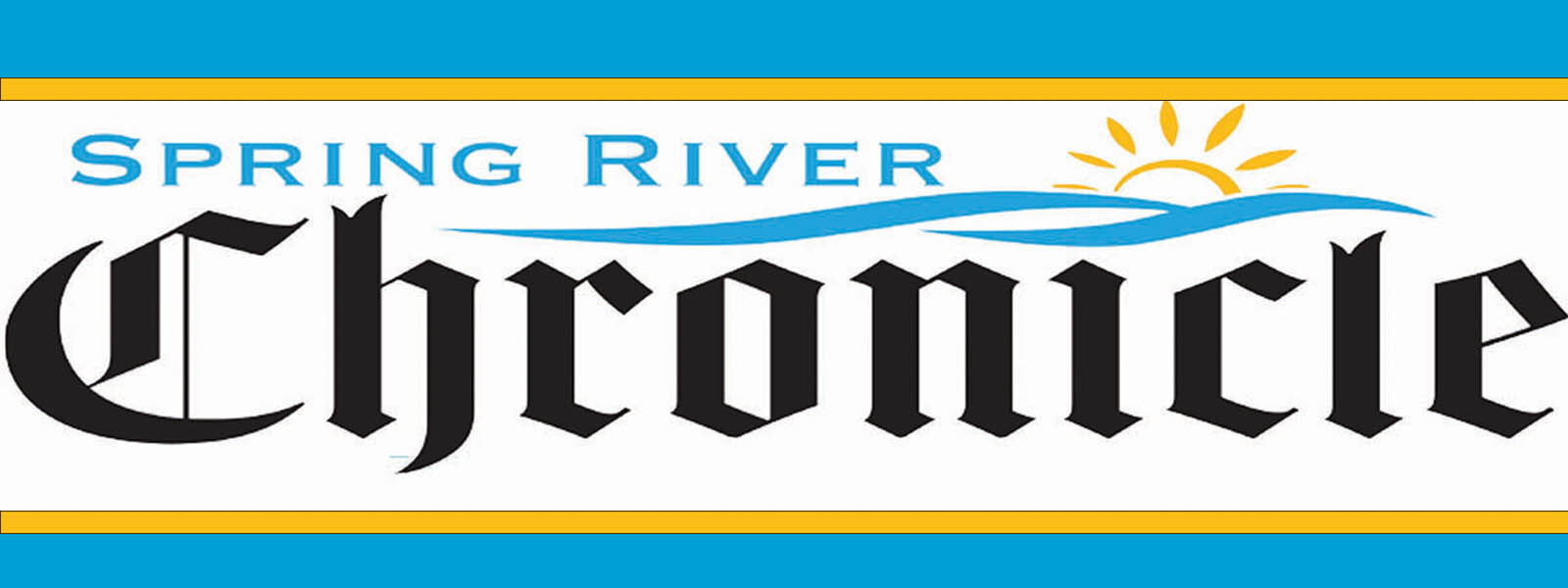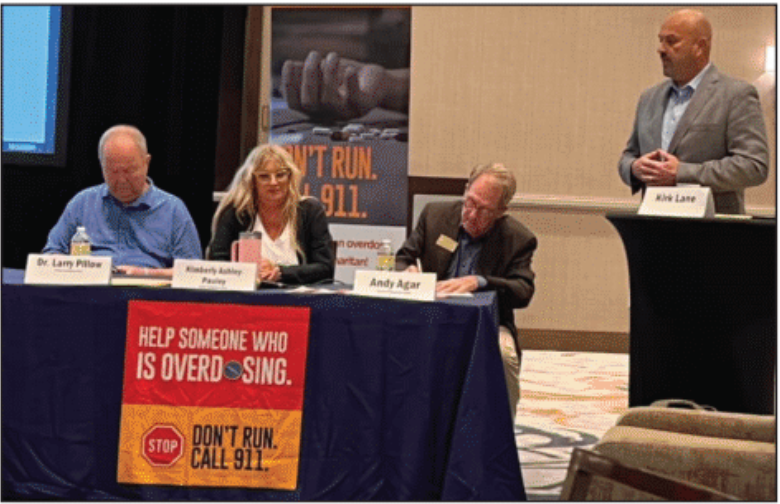Photo/Angelia Roberts
Dr. Larry Pillow, Kimberly Ashley and Andy Agar, who all lost children to opiod overdoses, spoke at an Opiod Conference last week in Jonesboro on the realities of the issue and how to cope and recognize signs. Former Arkansas Drug Director Kirk Lane (far right) monitored the two day conference.
By: Angelia Roberts, Special to the SRC
Parents who have lost children by drug overdoses made up the last segment of the two-day Opioid Conference last week in Jonesboro.
Kirk Lane, former Arkansas Drug Director, who now serves as the Director of the Arkansas Opioid Recovery Partnership, monitored the session.
Kimberly Ashley-Pauley, the mother of Joshua Pauley who was instrumental in getting the “Good Samaritan” bill that provides immunity for those seeking medical assistance during a drug overdose, Andy Agar, with the Criminal Justice Institute, University of Arkansas System and Rev. Dr. Larry Pillow who started Renewal Ranch and founder and CEO of WeCan network talked candidly about the pain of losing their children.
Grief and Stigma
“It was very important and actually therapeutic for me to talk about Josh. The part of Josh overdosing is just a tiny piece of what happened. There is so much more to Josh that I want people to know. I share my story so other parents will understand what I did not see and be more aware.”
As a mother, Ashley-Pauley said she felt the stigma associated with an overdose death.
“People immediately thought, how could I not have known. I was his mother. I knew he smoked marijuana. He was an adult and on a college campus. I did not know he was mixing pills and alcohol. Why did I not know what my child was doing? I have three other children and they were all raised the same.”
“I did private counseling and that helped immensely. I read a lot of books. I had people reach out to me that had lost children, but it wasn’t through the means Josh had passed away. I later got connected with parents who lost their children the same way and it was so helpful. You don’t have to explain it: it’s just known. Church was huge for me mentally – my faith came into play. I don’t know how I would have survived.”
Agar said the normal person who listens to the six o’clock news has no idea how bad this epidemic is, and the things parents go through when something like this happens.
“My stigma was personal. I’m a recovering alcoholic and recovering drug addict. I kept thinking I was one of them, why didn’t I know? You know something is wrong. You are just not certain; you just don’t want to have to face it. My stigma came from my own personal experience.”
Pillow said he continues to share his story for parents to let them know you cannot only survive, but thrive after the death of a child. “It is not the end of life, it’s the beginning of a different kind of life. I also share my story to help people understand there is purpose that comes out of pain. Sometimes some of the best things in life come out of the worst things in life. This has certainly been the case for me. Not to minimize my son’s death nor does that take away the pain, but it gives purpose to the pain. I think that is one of the keys to surviving whatever the loss may be.”
When it came to stigma, Pillow said his son was 28 years old and out of state when he died, and he saw none of that from his community.
I don’t recall seeking community services. As a minister, I took it upon myself to self-counsel. I’m a Read-a-Holic. I read scores of books on how to grieve. In my case I started a Fresh Start After Loss seminar and wrote a newspaper column, to not only help myself but to help other people. That was 20 years ago, and I still teach the Fresh Start seminar.”
Pillow said he highly recommends “Hope Heals” by Jay and Katherine Wolf, which is one of the most profound stories he has ever read.
“I had the church community, and they were good to me.” He said Romans 8:18 aided in his own personal healing and to put in layman’s terms, “I learned to minimize present things and maximize future hopes. That is one of those things that sustains me.”
Message to families
With more and more families dealing with addiction, the panel was asked what advice they would give others.
“Number one: Face reality,” Pillow said.
“Quit kidding yourself. Your son lies, doesn’t keep curfew, something is going on.
Number 2: Get on the same page as parents, if possible.
My son’s mother and I vacillated between me being an enabler and she being too hard on him. We rarely ever got on the same page.
Three: I had the naive notion that doctor prescribed drugs, if they prescribed drugs, it must be okay.
If your children are still at home, you are responsible for the drugs your children take.
Four: Get help for yourself.
When there is an addict in the family finger-pointing and blaming (won’t work). It’s a symptom of a family system’s problem most of the time. ‘I told you so. You know better,’ does more harm.”
“You can’t always do something about the behavior of your addict child, but you can always do something about your response to it. In hindsight, I realized now the first question I should have been asking was not, ‘What’s wrong with my son?’ the first question I should have asked is, ‘What can I do differently as a parent.’”
In hindsight, Ashley- Pauley said Josh’s behavior the last week of his life was spent sleeping more, being late for work, falling asleep at his job on campus where he was a lifeguard, but she wrote it off to his “being tired.”
She encourages parents to go through phones, check messages and know friends.
“Parents should trust their instincts. If they think something is wrong, then it’s wrong,” Agar said.
Law enforcement response
Lane asked how each family dealt with their situation with law enforcement.
“Josh’s friends were afraid to call 911. They literally dragged him out of the front door and left him on the bench at the hospital and got a nurse.”
She said law enforcement was not aware of that aspect and when they turned Josh’s phone over to the Conway Police Department, they found 600,000 text messages.
“If you think you can delete a text, it is not gone forever. Many were to the dealer he was buying his drugs from, and the case is still open.”
Pauley said everyone involved has remained very tight-lipped about what happened.
“I know what was in his system. I got bits and pieces. I have often said I would like to know what his last 12 hours were like, as a mom.”
Pillow said dealing with law enforcement did not factor in with his son’s death.
“It took me three or four months to go to Texas to get his personal items. In hindsight, I think probably the person he was staying with contributed to his overdose. I found out later that another guy who lived with the same person died and probably should have insisted on an investigation.”
“My son died at University of Arkansas. There was no interaction with the Fayetteville Police Department. The campus police department was all over it for a short period of time.”
Agar said the campus police made it clear: We don’t have a problem here.
“They knew they had a problem but didn’t want to talk about it at all. It was the best kept secret.”
Fighting the battle
Pillow told at the conference how much he appreciates the role everyone plays.
“I’m a cheerleader big time for anybody, anywhere who is trying to help other people who have addiction problems. I grew up about 30 miles from here on a cotton farm. My father was a sharecropper and a binge drinker. I’m the son of an alcoholic and the father of a son who died of drugs and alcohol. What gets me up early and keeps me up late is a passion to see every parent have the opportunity to have a sober child and see every child have the opportunity to see a sober parent. My heart aches, breaks, and will be perpetually wounded not only for the death of my son. Regardless of what you do, even though your task may be minor, that minor difference can make a major difference in somebody else’s life.
“We can overcome addiction and I really believe that. We don’t have to live the way we live. We don’t have to have a drug problem. We can win over addiction if we can get together, work together and do all we can. “
Ashley- Pauley said juvenile education is huge factor.
“I am so proud of the state of Arkansas, the NARCANsas app, the Peer Recovery Specialists going into emergency rooms and approaching people when they are at the lowest.
Agar said his son had been in numerous treatment facilities and had fought the battle
“I know he got frustrated, but this is a battle. This is a war. This is a burning hell out there for these kids and even older people that are having problems with opioid addiction. We can’t give up.”
Director’s
comments
In closing, Lane said, “Recovering out loud from a parent is really the loudest voice in the room. It makes my vows to conquer this so much stronger.”
He said in his new role the money coming in from the lawsuit against big pharma means more money will be coming to the state, cities and counties.
“They saw the value in formulating the Arkansas Opioid Recovery Partnership, which I was hired to direct. One of my vows is we are going to create something not so bureaucratic that we can’t get money out to the people that need it and not for people that profit off the backs of those who have suffered. That’s what I have been tasked to do. We are holding this to a high standard to help people.”
Angelia Roberts is the Comprehensive Opioid Abuse Program Project Coordinator for Izard County. For more information on rehabilitation or educational programs contact Roberts at 870-613-3323 or to speak with a Peer Specialist contact Josh Ramsey at 870-805-6181 or Ashley Sanders at 870-213-1624.

